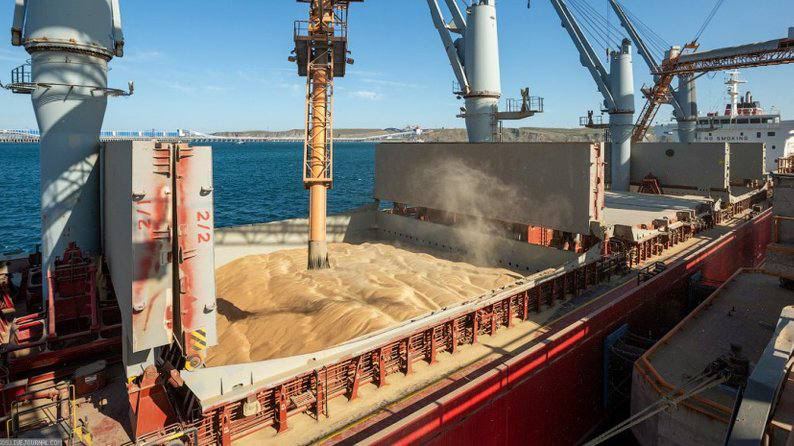The European Commission has slammed Poland and Hungary for their unilateral decision to ban grain and other food imports from Ukraine, Reuters reports.
A European Commission spokesperson stated that "trade policy is of EU exclusive competence and, therefore, unilateral actions are not acceptable."
"In such challenging times, it is crucial to coordinate and align all decisions within the EU," the spokesperson added.
Following Russia's invasion of Ukraine, which blocked some Black Sea ports, large quantities of cheaper Ukrainian grain ended up in Central European states due to logistical bottlenecks. Local farmers claim this has negatively impacted prices and sales in these countries. However, Olha Trofimtseva, Ukraine's ambassador-at-large responsible for food security and agricultural exports, refutes the allegations, asserting that the drop in food prices is a worldwide phenomenon and that the demonstrations against Ukrainian grain are driven by emotions rather than reason.
Polish and Hungarian bans on Ukrainian produce imports
Following protests by Polish farmers, Poland on 15 April had decided to temporarily ban Ukrainian food imports until 30 June. Poland's Agriculture Minister Robert Telus argued that the ban was necessary to "open the eyes of the EU to the fact that further decisions are needed that will allow products from Ukraine to go deep into Europe, and not stay in Poland."
The next day, Hungary also enacted a temporary ban on grain and oilseed imports from Ukraine, also until 30 June, a period that Hungary's Minister of Agriculture, István Nagy said was sufficient "to find a long-term solution, consider a full duty-free regime for Ukrainian goods and the functioning of solidarity corridors."
"The government is committed to representing the interests of Hungarian farmers, which is why, in the absence of significant measures from the EU, it will temporarily ban the import of grains and oilseeds from or to Ukraine, as well as some other agricultural products to Hungary, as Poland has done," Nagy said.
The Hungarian minister claimed that Ukrainian agriculture "works with production practices that are no longer allowed in the European Union" and imports of its products "made it impossible for domestic and Central European farmers to sell their products."
Poland and Hungary's bans have caused tension with Ukraine. Mykola Solskyi, Ukraine's farm minister, spoke with his Hungarian counterpart Istvan Nagy, stressing that unilateral decisions are unacceptable. The Ukrainian Agricultural Ministry said the Polish ban contradicts existing bilateral agreements on exports.
On 17 April 2023, the Ministers of Agriculture of Ukraine and Poland
are expected to meet on the territory of Poland to sign an agreement on the further export of Ukrainian grain to third countries through the territory of Poland.
Ukraine typically exports most of its agricultural goods, especially grain, via its Black Sea ports, unblocked in July as part of an agreement between Ukraine, Türkiye, Russia, and the United Nations. The accord is set to expire on May 18, and Moscow has indicated that it may not be extended unless the West removes obstacles to the export of Russian grain and fertilizer.
Protests against exports of Ukrainian grain to Europe: background
Farmers in Eastern Europe have been protesting against the influx of Ukrainian grain, blaming it for their financial struggles as local crop prices plummet. According to LIGA.net, Poland has been hit the hardest, with farmers demanding restricted access to Ukrainian agricultural produce. As a result, Ukraine was forced to suspend its exports of wheat, corn, sunflower, and rapeseed to Poland until July. Protests have also erupted in Romania, with farmers demanding the reinstatement of duties on Ukrainian grain.
Ukraine experienced a surge in agricultural exports to the EU in 2022, following the invasion by Russia. The EU lifted duties and quotas on imports of Ukrainian agricultural products, and helped arrange for grain blocked by Russia in Black Sea ports to be transported via Polish and Romanian road and rail networks. Ukrainian grain exports increased significantly, particularly to Poland, causing tensions between the countries.
However, Olha Trofimtseva, the ambassador-at-large in charge of food security and agricultural exports, argued that blaming Ukrainian grain for falling prices in Poland, Romania, and Bulgaria is a “big exaggeration.” She explained that the decline in food prices is a global trend, and the protests against Ukrainian grain are emotional rather than rational.
Experts believe that the countries’ efforts to pressure the EU for more compensation are primarily aimed at bargaining for larger subsidies. Despite the challenges, Ukraine is expected to adapt and potentially shift focus towards processed products for export.




